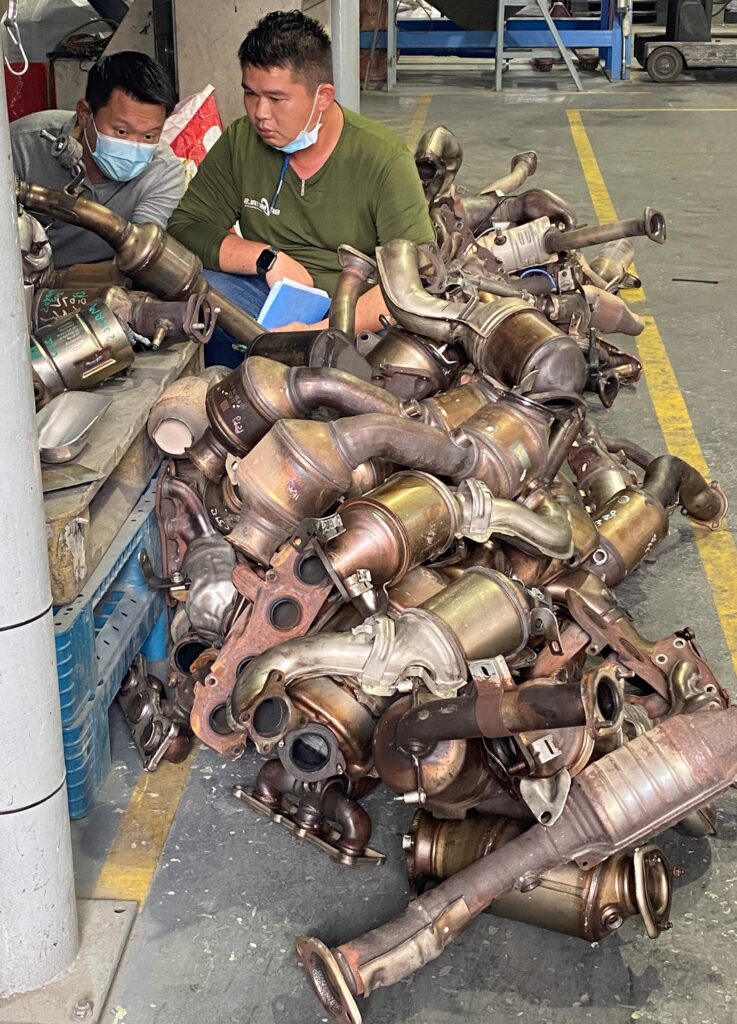
When you’re in the business of selling catalytic converters for recycling, it’s essential to understand how their value is determined. This knowledge can mean the difference between a fair deal and a missed opportunity for profit. Catalytic converters are valuable because they contain small quantity of precious metals like platinum, palladium, and rhodium—collectively known as Platinum Group Metals (PGMs). However, not all converters are created equal, and several factors can affect their price.
1.PGM Content: The Precious Metal Factor
The primary factor that determines the value of a spent catalytic converter is the amount and type of PGMs it contains. Different manufacturers use different combinations and amounts of these metals. For instance, a converter from a luxury vehicle might contain more PGMs than one from a compact car. Furthermore, the specific model and year of the vehicle can also influence the PGM content.
2.Current Metal Prices: The Market’s Pulse
PGMs are traded on global commodity markets, and their prices can fluctuate widely based on supply and demand dynamics. Economic factors, technological advancements, mining outputs, and even geopolitical events can impact these prices. As a seller, keeping an eye on current PGM prices can help you estimate when it might be the best time to sell your converters.
3.Converter Conditions: Wear and Tear Matters
The condition of a catalytic converter can significantly affect its value. A damaged converter may have lost some of its precious metal content due to physical impacts, thermal degradation, or clogging. Converters that have been exposed to certain contaminants or have had their ceramic monolith cracked or broken will also fetch a lower price.
4.Identifying Features: Know Your CAT
Each catalytic converter has identifying features such as serial numbers, OEM (Original Equipment Manufacturer) numbers, or even specific physical characteristics. These markers help in determining the exact model and, consequently, the potential PGM content. This information is available from many pricing APPs in market. BR Metals will be sharing our online price catalogue for free with our loyal customers later this year.
5.Legal and Environmental Regulations: Compliance Counts
Lastly, the recycling industry is subject to strict legal and environmental regulations. Companies that adhere to these regulations have higher operating costs, which can influence the prices they offer for catalytic converters. However, these companies usually have the right technology, proven recycling process and a strong track record. Although they may not offer the highest prices or rates, you can be assured that these companies will handle your recycling needs with professionalism and transparency, and not some fly by night operations.
Final Thoughts
Understanding the valuation of catalytic converters is a complex process, but it’s crucial for making informed decisions when selling or recycling. By considering the PGM content, current metal prices, converter conditions, identifying features, and compliance with regulations, you can navigate the market more effectively.
Remember, knowledge is power in the world of catalytic converter recycling. Stay informed, stay savvy, and ensure that you’re getting the best possible value for your converters.
If you have any questions about recycling your catalytic converters, email us at info@brmetalsltd.com or WhatsApp +65 8102 5860





